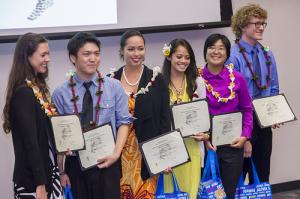By Staff Reports
(Honolulu)– Some might say the first students to be accepted into the John A. Burns School of Medicine (JABSOM) Class of 2017 earned their admission the hard way. They completed a grinding one-year course of study at the University of Hawaiʻi at Mānoa medical school that many say can be more difficult than the actual first year of MD studies.
But the newest graduates of the `Imi Ho`ōla (“Those who seek to heal”) Post-Baccalaureate Program see the opportunity they have seized to realize their dreams as a precious gift. So does Kaiser Permanente pediatrician Dr. Patrice Ming-Lei Tim Sing (Hawai`i Permanente Medical Group, Hawai`i Kai), the 1989 `Imi alumna chosen as the `Imi Ho`ōla Completion Ceremony keynote speaker, representing all 234 MDs who have earned their degrees by starting with `Imi.
“I stand here before you representing that cadre of `Imi Ho`ōla graduates who have the privilege of pursuing medicine as a career and, more importantly, the responsibility to make a difference,” Dr. Sing told the class of 2012-2013.
2013 is the 40th year since the founding of the `Imi program, designed to help even the playing field for socially and economically disadvantaged students, often of ethnic minorities, who seek admission to medical school.
“This is a program that is of great value by our school, because it allows students whose path to medical school has been nontraditional, who have been sometimes challenged by difficulties getting through coursework and studying while working a job, to be compared as equals during the application process,” said JABSOM Dean Jerris Hedges, MD–himself a product of a rural upbringing. “Now they have more than proven their worth and are ready to begin the next phase of their career,” said Dr. Hedges.
Dr. Sing said that the six graduates, though considered “disadvantaged” when they started their studies, may actually find their diversity an advantage.
“Each one of you was chosen for this program because of your potential to become a physician. What you may not have realized is the tides of health-care reform have moved your potential to higher levels, and it’s because you came from a disadvantaged background, I believe, this will be your advantage. You come from points of seed that will add innovation, out-of-the-box thinking and diversified approaches to health care. This will streamline care and inevitably keep costs down,” said Dr. Sing.
The students completing `Imi each year are guaranteed admission to the next MD class. The six who celebrated on June 12 are Courtney Gaddis of Honolulu; Caleb Jeon of Honolulu; Nohea Leatherman-Arkus of Honolulu; Amanda Mesa of Guam; Yuho Ono of Honolulu and Nash Witten of Haleiwa. They will join JABSOM’s entering Class of 2017 when it begins its studies at JABSOM in mid-July.
The students were reminded by Dean Hedges that there is still a challenge ahead. “Medical school itself is a challenge that requires us to pull deep from within to decide whether this is a calling and to put our best effort forward,” said the Dean.
Student Nash Witten was chosen to represent the `Imi class with opening comments at the ceremony. He chose a song about an `ohi`a lehua tree written by Queen Lili`uokalani as an appropriate metaphor for the collective life experiences of the class.
“Found in a variety of habitats from the lava fields of Hawai`i island to the marshes of Mount Ka`ala, it represents the variety of locations that we may someday serve as physicians,” said Witten.
Dr. J. Keawe`aimoku Kaholokula, Chair of the JABSOM Department of Native Hawaiian Health (which includes the `Imi program), complimented Witten’s choice. “`Ōhi`a lehua is known as one of the first signs of life after a volcano devestates an area,” he said. “Itʻs one of the first plants that come out. Like our students from socially disadvantaged backgrounds, they still blossom and flourish under such conditions,” he said, adding that “lehua is also a poetical reference to an expert, and an expert is what all of you are becoming: an expert in your profession of medicine.”


